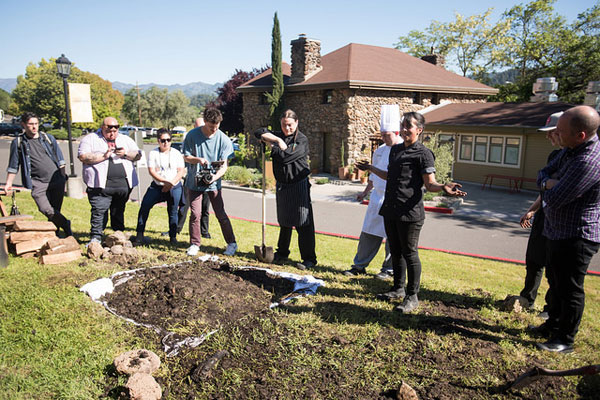
March 21, 2019; Voice of America and Minnesota Public Radio
The James Beard Foundation has announced that Sean Sherman, a member of the Oglala Lakota Sioux nation from Pine Ridge, South Dakota, and founder and CEO of The Sioux Chef, will receive a Leadership Award for his work in helping Native Americans reclaim their historic food and agricultural systems.
Sherman is one of five award winners. The winners of the leadership award have included a wide range of food justice leaders. Five awardees were named for 2019. This year’s winners, in addition to Sherman, are the Massachusetts-based Pioneer Valley Workers Center; Cornelius Blanding, executive director of the Federation of Southern Cooperatives-Land Assistance Fund; Leah Penniman, co-executive director and program manager at the upstate New York-based Soul Fire Farm; and Anim Steele, executive director of Real Food Generation. Each winner will receive, in addition to the award itself, a $10,000 cash prize.
Sherman’s award marks the first time a Native American food leader has won an award in the “Leadership” category since its creation in 2011. Last year, however, Sherman himself won a Book award from the Beard Foundation for publishing the best book in the American cuisine category, alongside coauthor Beth Dooley, for The Sioux Chef’s Indigenous Kitchen.
The Leadership Award, notes Cecily Hilleary of Voice of America, “celebrates food system visionaries.” The award, she adds, “acknowledges Sherman’s extensive research into diverse Native American farming techniques, wild food usage and harvesting, land stewardship, food preservation, as well as tribal cultures and histories.”
Sign up for our free newsletters
Subscribe to NPQ's newsletters to have our top stories delivered directly to your inbox.
By signing up, you agree to our privacy policy and terms of use, and to receive messages from NPQ and our partners.
“We’re trying to raise awareness of the history of the land and on how to live sustainability on what’s around us,” Sherman said to Hilleary. Sherman notes that much of his work centers on recovering the cuisine that existed among American Indians prior to the arrival of European settlers. On reservations, American Indians were restricted in their rights to hunt, fish, or forage, and thus forced to make do with US Army rations of flour, lard, and salt—which were later replaced by the commodity food program.
“That has never been a nutritional program, and it has contributed to the health epidemics that we see in tribes across the country—mass obesity, mass rates of heart disease, Type Two diabetes—you name it,” Sherman points out. “A change has to take place, and this is the best way to start to utilize the lessons of our ancestors that would have been passed down to us, if it hadn’t been for cultural assimilation efforts.”
In 2014, Hilleary notes, Sherman launched “Sioux Chef,” an obvious play, she notes, on “the French term sous-chef, the number two person in any restaurant kitchen.” The catering business, Hilleary adds, brings together “chefs, food preservationists, botanists, and enthusiasts” from American Indian nations, with the common goal of restoring pre-contact diets.
Chris Graves of Minnesota Public Radio adds that Sherman in 2018 also co-founded the nonprofit North American Traditional Indigenous Food Systems (NATIFS), which, Graves explains, “is in the process of opening a non-profit restaurant and training center called the Indigenous Food Lab.”
This year, Sherman and his team also hope to open a Native American restaurant in Minneapolis. At the nonprofit, Sherman explains to Hilleary, people will be able to “take classes on wild foods and education, agriculture, or food preservation.” Meanwhile, Sherman adds, “the restaurant is designed to allow people to develop their skills working alongside us in the restaurant. The ultimate goal, Sherman says, “is to open up indigenous food labs in cities everywhere.”—Steve Dubb










